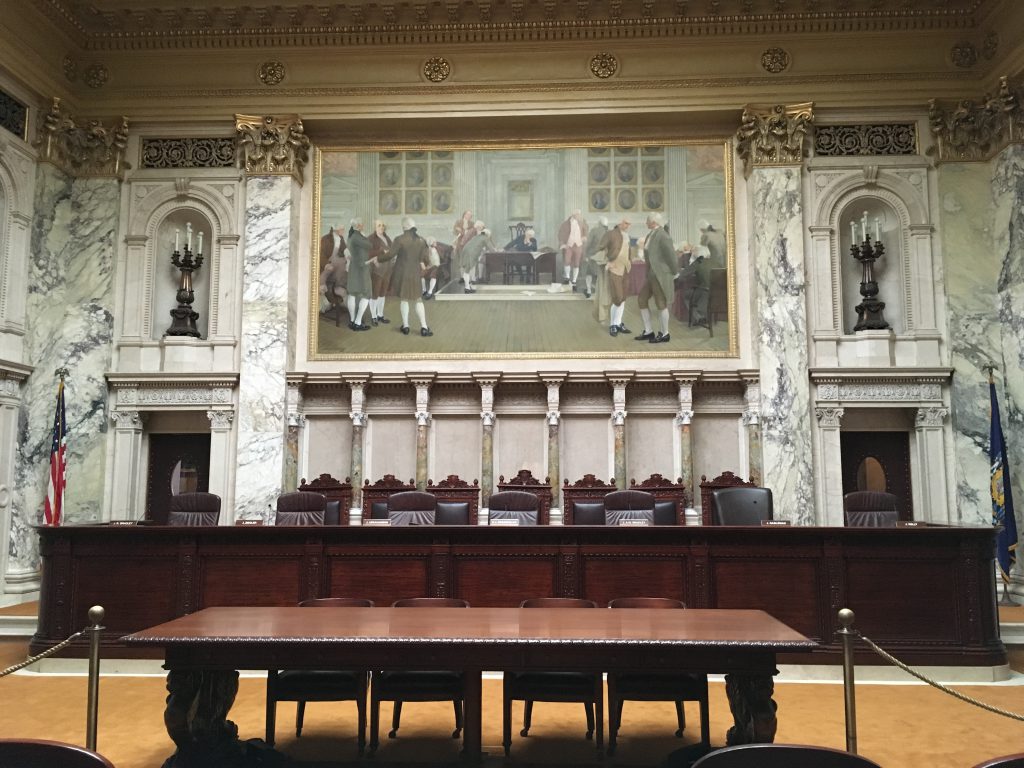WI Supreme Court Curtails Legislative Committee’s Rule Making Authority
4-3 decision sides with Evers in dispute over conversion therapy ban.
State laws that let a 10-member committee of the Legislature override regulations are unconstitutional, a majority of the Wisconsin Supreme Court ruled Tuesday.
The ruling hands the administration of Democratic Gov. Tony Evers a victory in an ongoing battle with the Legislature’s Republican leaders.
It also affirms that the state Legislature cannot renew its attempt to block regulations against conversion therapy for LGBTQ people, and appears to clear the way for an update of Wisconsin’s building code that was suspended nearly two years ago.
The ruling finds five statutes, granting power to the Legislature’s committee that reviews and periodically suspends administrative rules, violate the Wisconsin Constitution.
Taken together, wrote Chief Justice Jill Karofsky for the four justices making up the Court’s liberal wing, the statutes give the Joint Committee for the Review of Administrative Rules the power to effectively change state laws without going through the full legislative process.
“The ability of a ten-person committee to halt or interrupt the passage of a rule, which would ordinarily be required to be presented to the governor as a bill [to block the rule], is simply incompatible with Articles IV and V of the Wisconsin Constitution,” Karofsky wrote.
The Court’s three conservative justices took issue with the majority opinion, asserting that rulemaking itself involves legislative power and that Tuesday’s ruling improperly constrains the Legislature as the elected representatives of the people.
‘Legislative veto’ lawsuit
The decision is the second to come from a lawsuit Evers filed in the fall of 2023, Evers v. Marklein, accusing the Republican leaders of the Legislature of exercising an unconstitutional “legislative veto” hampering the lawful powers of the executive branch to make administrative rules.
The Evers administration argued that five statutes granting JCRAR the power to review, object to and block rules before or after they are promulgated violate the state Constitution. Those include a law enacted in December 2018, after Evers was elected governor but before he took office, that allows the committee to lodge “indefinite” objections blocking a rule.
The Court majority agreed with the administration’s argument.
The Wisconsin Constitution requires that for a law to be enacted, it must pass both the Assembly and the Senate and then be presented to the governor to be signed or vetoed.
“By permitting JCRAR to exercise discretion over which approved rules may be promulgated and which may not, the statute empowers JCRAR to take action that alters the legal rights and duties of persons outside of the legislative branch” without going through the lawmaking process, Karofsky wrote.
The indefinite objection “prevents the agency from promulgating a rule unless the Legislature passes a bill enacting the rule,” she wrote. “Said another way, legislative inertia after an indefinite objection could permanently stop the promulgation of a rule.”
The law allowing the committee to pause a rule for 30 days before it is promulgated “essentially allows JCRAR to capture control of agency rulemaking authority from the executive branch during the 30-day pause period,” Karofksy wrote.
The pause, which can be extended to 30 days “operates as a ‘pocket veto,’” she wrote. “Even if such an interruption is relatively brief, the constitution does not contemplate temporary violations of its provisions.”
Similarly, after the rule has been promulgated, JCRAR’s power to suspend it multiple times “means that even after promulgation, JCRAR could suspend a rule repeatedly in perpetuity with no other checks in place,” the chief justice wrote.
Clearing way for conversion therapy ban, new building code
In overturning the five statutes, the Court majority also revoked two earlier rulings that had affirmed some of JCRAR’s powers — one from 1992, upholding the committee’s temporary suspension of a rule, and the other from 2020, endorsing the power to suspend a rule multiple times.
Evers’ suit focused on two rules that JCRAR blocked, both produced under the umbrella of the state Department of Safety and Professional Services (DSPS).
One rule prohibited therapists from using discredited conversion therapy to try to change the sexual orientation or gender identity of LGBTQ people. It was adopted by the Wisconsin Marriage and Family Therapy, Professional Counseling, and Social Work Examining Board.
“When the Board created new professional conduct rules banning conversion therapy, it exercised its statutory authority,” Karofksy wrote. “But when JCRAR objected to the rule it effectively blocked the Board’s authority” under Wisconsin law “to govern the professional conduct of its licensees.”
The conversion therapy rule was suspended in January 2023, but reinstated after the Legislature concluded its work for the 2023-24 session.
With “the multiple suspension provision,” however, Karofsky wrote, “JCRAR has the authority to suspend this rule again, in perpetuity.”
Another rule updated the state commercial building code to international standards set in 2021.
“The goal of these chapters is to protect the health, safety, and welfare of the public,” Karofsky wrote. JCRAR’s indefinite suspension of the code in 2023 “prevented DSPS from completing its statutory rulemaking duties,” she wrote.
Conservative justices object
Justice Brian Hagedorn, one of three members of the Court’s conservative wing, wrote an opinion that concurred with the majority on narrow grounds but dissented on finding the five laws at issue unconstitutional.
The JCRAR indefinite objection to the building code rule is unconstitutional under a 1992 Wisconsin Supreme Court ruling, Hagedorn wrote.
He argued that the conversion therapy rule is now outside the Court’s purview, however.
“This ethical rule is already in effect; it is no longer suspended,” Hagedorn wrote. “Since a ruling on JCRAR’s actions with respect to this rule would have no legal effect, this claim is moot, and we have nothing further to decide.”
Hagedorn criticized the decision’s far-reaching findings that whole statutes were unconstitutional, however. He said it also failed to grapple with arguments about the constitutional status of regulation by executive branch agencies.
“The effect of the majority’s decision is to greenlight executive alteration of legal rights and duties outside the lawmaking process while prohibiting legislative alteration of legal rights and duties outside the lawmaking process,” Hagedorn wrote.
Former Chief Justice Annette Ziegler and Justice Rebecca Bradley published separate sharply worded dissents.
Ziegler wrote that the majority ruling was the outcome of “this court’s misguided quest to restructure and unbalance our state government, culminating in even more power and control being allocated to the executive branch.”
“The legislature has delegated executive branch agencies broad rulemaking authority with the understanding that it will be able to oversee administrative rulemaking through JCRAR,” Ziegler wrote. “The majority now pulls the rug out from under the legislature…”
Bradley, invoking lyrics from Bruce Springsteen’s song “Badlands” in which the singer says “a king ain’t satisfied ‘til he rules everything,” charged that the majority “lets the executive branch exercise lawmaking power unfettered and unchecked.”
Her dissent offered a full-throated attack on the administrative state and executive branch regulatory authority.
“The majority invokes the Wisconsin Constitution to take power from the People’s elected representatives in the legislature and bestow it on the executive branch, empowering unelected bureaucrats to rule over the People,” Bradley wrote.
State Supreme Court curtails Legislature committee’s right to stop regulations was originally published by the Wisconsin Examiner.
If you think stories like this are important, become a member of Urban Milwaukee and help support real, independent journalism. Plus you get some cool added benefits.























the action that the JFC to block Ozaukee County’s purchase of the Clay Gorge Cedar Bluffs purchase by unidentified member of the JFC because reported someone wanted to develop it is a good example of why the decisions of the JfC need to be curtailed. When one member can stop a project, corruption is more likely to happen. The Attorney General should have investigated to see if there was a bribe or kickback from the developer to the JFC members who killed the project.
Amusing that conservative Former Chief Justice Annette Ziegler and Justice Rebecca Bradley are critical of the State’s executive branch, but are all for the POTUS and SCOTUS taking more power. Hypocracy!
The JFC, dominated by Republicans (16 to 4 Democrats) has become a legislative veto over all laws passed by the Legislature and signed by the government. The Wisconsin Constitution does not grant veto powers to any member or committee of the Legislative branch. If the JFC doesn’t like rules established by departments of the executive branch, their recourse is to bring before the Assembly and Senate in the form of a bill. This is called the division of powers between the 3 branches of government. Republicans have been doing their best to undermine this foundational principle of our democratic republic.